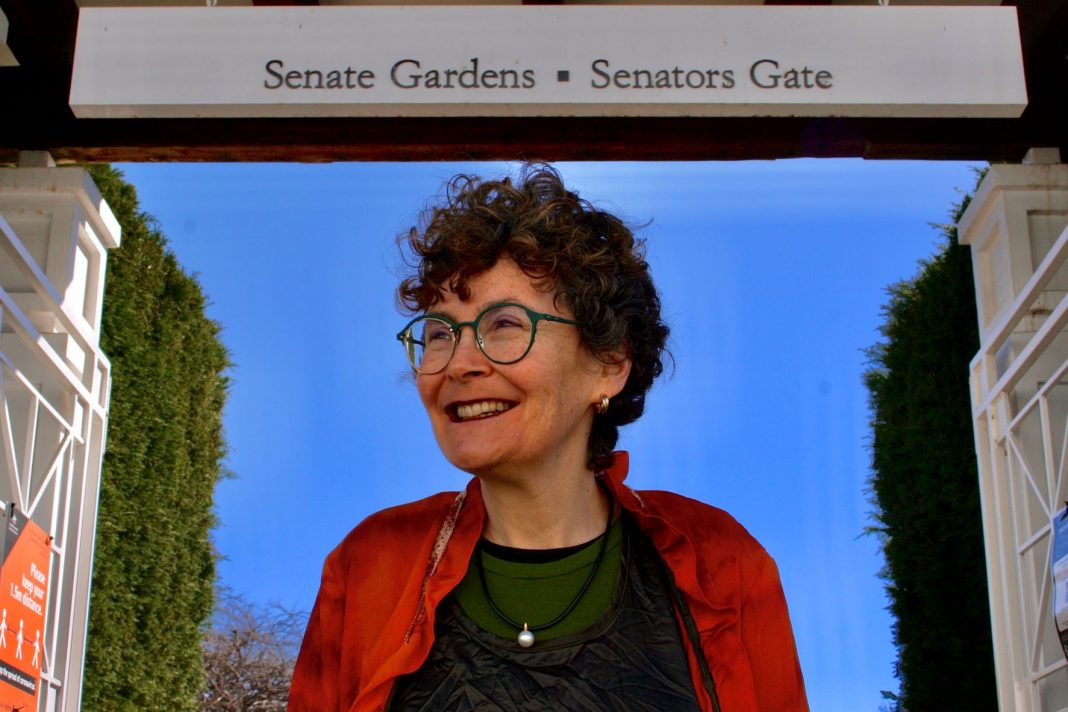As the referendum looms and Canberrans re-acquaint themselves with the Australian Constitution, it seems the closest encounter we have with it is driving down Constitution Avenue or watching The Castle (“It’s just the vibe of the thing”).
Unbeknownst to many, the 1901 document isn’t actually ours but rather a British Government-owned document that we sort of “borrowed”.
According to Constitution Education Fund Australia, former Prime Minister Bob Hawke asked then British Prime Minister Margaret Thatcher for the original document but he was knocked back – four times. He kept trying for four years. Finally, British Parliament loaned us a copy of the original Constitution for Australia’s bicentenary in 1988. More than two million Australians went to see it.
When the due date arrived in 1989, Australia didn’t give it back. That’s convicts for you. Bob Hawke had stated throughout his negotiations with the British Government that he wanted to keep an original copy of the Constitution in Australia but British pollies objected.
In 1990 (I wonder what the overdue fine was), Bob Hawke wrote an article addressed to the British people in The Times, titled “Please complete our birth certificate”, explaining why the document was so important to Australia.
The British Government finally gave in and gifted the original document to Australia. The public can now view “our” Constitution down the road at the National Archives of Australia. There is a special “lifting the lid” event this Friday, 6 October and next Friday, 13 October.
Back to the looming referendum. It’s worth noting that Canberrans (and Northern Territorians) will not be counted in the state-majority. It’s worth noting because the Voice is about Indigenous Australians being counted in decisions that affect them. How’s the irony?
“It doesn’t feel very nice to be excluded,” says constitutional lawyer Professor Kim Rubenstein.
The referendum needs a double majority to be successful – a population majority (in which ACT and NT are counted) and a state majority (from which the ACT and the NT are excluded). We were but a glint in federation’s eye when the Constitution was drafted in 1901.
“The ACT didn’t get counted in the state majority in the 1999 referendum on becoming a republic either,” says Kim. “Until 1977, the territories were not counted in any aspect of a referendum. So, in the 1967 referendum to give Indigenous Australians the right to vote, the ACT’s Indigenous and non-Indigenous Australians did not get to vote.”

It’s worth getting to know our Constitution because it’s surprising what’s not in it just as much as what is in it. Kim tells me that the Prime Minister does not rate one mention in the Australian Constitution. The Governor-General gets plenty.
“If an alien visited our country, they would think the King was in charge,” she says. “If the King was in the country, he’s head of the executive branch of the government (which signs off on all the laws). The Crown is the head of the system and no power is ascribed to the Prime Minister.”
The constitutional status of the Governor-General is apparent here in Canberra, just compare the sprawling 130 acres that Government House sits on, with the Lodge (sounds like a hut in the alps) which sits on 4.4 acres.
The Constitution (written by all white men) does seem in need of a renovation. Alarmingly, Section 25 still exists, a provision which allows state governments to ban people of a certain race from voting.
There’s even an “aliens head of power” mentioned in the constitution. Look out E.T.
“They discussed if there should be a head of power over citizenship for the whole country,” Kim explains.
“They ultimately decided not to because it would be too obvious that they were discriminating against British subjects who were from India because they were non-white and they wanted to keep out non-white people. So, rather than use the word ‘citizenship’ they called it ‘aliens’. If you’re not a British subject you are an alien. That’s a reminder, we need this constitution to be more inclusive.”
So why don’t Australians know more about their Constitution and yet Americans can recite their second or fifth amendment off-by-heart? They even wrote a Broadway musical about it.
“It wasn’t a glorified start through a revolution or through a civil war,” Kim says.
“The way we came together was a formally democratic one. It was an orderly step in terms of sitting down with elected representatives from each of the states and coming together to agree on a constitution.
Professor Kim Rubenstein
Since 1901, the Australian Constitution has been amended eight times. The task to change it is an onerous one – but then again, the Constitution is the foundation of every law in Australia so it shouldn’t be a breeze to amend it.
“Anything that happens every day in people’s lives is in some way affected by the Australian Constitution. It’s really profound,” Kim says.
Kim has partnered with ANU Wiradyuri scholar James Blackwell with the support of the University of Canberra to produce a free podcast, ‘It’s not just the vibe, it’s the constitution’. Available on all apps: ucfm.com.au/its-not-just-the-vibe-its-the-constitution/
podcasts.apple.com/au/podcast/its-not-just-the-vibe-its-the-constitution/id1700192230
Canberra Daily is keen to hear from you about a story idea in the Canberra and surrounding region. Click here to submit a news tip.


